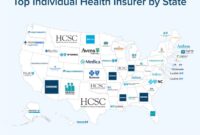Health insurance for single people is a critical aspect of financial planning and well-being. In this guide, we explore the importance of health insurance for individuals living alone and how it can offer the necessary protection against unforeseen medical costs.
We will also delve into the various types of health insurance plans suitable for single individuals, factors to consider when choosing the right plan, and practical tips on accessing health insurance tailored to the needs of single people.
Importance of Health Insurance for Single People

Health insurance is crucial for individuals living alone as it provides financial security in case of unexpected medical expenses. Without health insurance, single people may struggle to afford necessary healthcare services, putting their health and well-being at risk.
Entrepreneurs and freelancers can benefit from health insurance for self-employed individuals. With flexible options and tailored coverage, self-employed individuals can ensure they have access to quality healthcare without breaking the bank.
Financial Security
Having health insurance can help single people avoid significant financial burden in the event of illness or injury. With coverage in place, they can receive essential medical care without worrying about exorbitant costs that could potentially lead to debt or financial instability.
For those seeking personal health coverage , it’s essential to consider your unique healthcare needs. From routine check-ups to emergency care, a personalized plan can offer the protection you need to stay healthy and happy.
Access to Healthcare Services
Health insurance enables single individuals to access a wide range of healthcare services that they might otherwise not be able to afford. From routine check-ups to emergency treatments, insurance coverage ensures that they can prioritize their health and well-being without sacrificing other essential needs.
When it comes to securing individual health insurance plans , it’s crucial to understand the coverage options available. Whether you’re looking for comprehensive benefits or specific coverage for certain conditions, finding the right plan can provide peace of mind for you and your family.
Types of Health Insurance Plans Suitable for Single Individuals: Health Insurance For Single People
When it comes to choosing a health insurance plan as a single individual, there are several options available. Understanding the differences between HMO, PPO, and high-deductible health plans can help you make an informed decision based on your specific needs and budget.
HMO (Health Maintenance Organization)
An HMO plan typically requires you to choose a primary care physician (PCP) who will coordinate all of your healthcare needs. You will need referrals to see specialists, and all your care is usually within a network of providers. HMO plans are known for their lower out-of-pocket costs and premiums, making them an attractive option for single individuals looking to save on healthcare expenses.
PPO (Preferred Provider Organization)
PPO plans offer more flexibility in choosing healthcare providers compared to HMOs. You can see specialists without a referral and can visit out-of-network providers, although at a higher cost. While PPO plans generally have higher premiums and out-of-pocket costs than HMOs, they provide greater freedom and choice in healthcare decisions, which can be beneficial for single individuals who value flexibility.
High-Deductible Health Plans
High-deductible health plans come with lower premiums but higher deductibles compared to HMOs and PPOs. These plans are often paired with Health Savings Accounts (HSAs), allowing you to save money tax-free for medical expenses. High-deductible plans are suitable for single individuals who are generally healthy and don’t anticipate needing frequent medical care. They can be a cost-effective option for those looking to save on premiums while still having coverage for major medical expenses.
By understanding the benefits and considerations of each type of health insurance plan, single individuals can choose the option that best fits their healthcare needs and financial situation.
Factors to Consider When Choosing Health Insurance as a Single Person

Choosing the right health insurance plan as a single individual involves considering various factors that can impact your coverage and costs. It’s essential to evaluate premiums, deductibles, and coverage options to ensure you select a plan that meets your healthcare needs and budget.
Premiums
When assessing health insurance plans, it’s crucial to understand the cost of premiums. Premiums are the monthly payments you make to maintain your health insurance coverage. Consider your budget and choose a plan with premiums that you can afford without compromising other essential expenses.
Deductibles
Deductibles are the amount you must pay out of pocket before your insurance coverage kicks in. Higher deductibles often result in lower premiums, but you’ll need to pay more upfront for medical expenses. Evaluate your typical healthcare usage to determine if a plan with a higher deductible and lower premium is suitable for your needs.
Coverage Options
Evaluate the coverage options offered by different health insurance plans. Consider factors such as in-network providers, prescription drug coverage, preventive care services, and coverage for specialist visits. Choose a plan that aligns with your healthcare needs to ensure you have access to the necessary services.
Evaluating Individual Needs
To select the most suitable health insurance plan, single individuals should assess their healthcare needs. Consider factors such as pre-existing conditions, prescription medications, frequency of doctor visits, and any anticipated medical procedures. By estimating your healthcare needs, you can choose a plan that provides adequate coverage for your specific situation.
Estimating Healthcare Needs
One way to estimate your healthcare needs is to review your medical history and past healthcare expenses. Consider any ongoing medical conditions or treatments that require regular monitoring or management. Additionally, factor in any potential changes in your health status or lifestyle that may impact your healthcare needs in the future. By estimating your healthcare needs accurately, you can select a health insurance plan that offers comprehensive coverage.
Accessing Health Insurance for Single People

When it comes to accessing health insurance for single individuals, there are several options available depending on their circumstances and needs. Whether it’s through an employer-sponsored plan, the private market, or government programs, single people have choices to consider.
Employer-Sponsored Health Insurance
Employer-sponsored health insurance is a common way for single individuals to access coverage. Many companies offer health insurance benefits to their employees as part of their compensation package. Single individuals working full-time for an employer that provides health insurance can often enroll in these plans.
Private Market Health Insurance, Health insurance for single people
For those who do not have access to employer-sponsored health insurance, the private market is another option. Single individuals can purchase health insurance plans directly from insurance companies or through insurance marketplaces. It’s essential to compare different plans and choose one that meets their healthcare needs and budget.
Government Programs
Government programs like Medicaid provide health insurance coverage for low-income individuals, including single people. Eligibility criteria for Medicaid vary by state, but single individuals with limited income and resources may qualify for this program. It’s important for single individuals to check the eligibility requirements in their state and apply accordingly.
Navigating the Application Process
Applying for health insurance, especially for single individuals, can be a daunting task. However, there are resources available to help navigate the process. Single people can seek assistance from healthcare navigators, insurance brokers, or online platforms to understand their options and choose the right plan. Additionally, there may be subsidies or financial assistance available for those who qualify based on their income level.
In conclusion, securing health insurance as a single person is not just about protecting yourself from medical expenses but also ensuring peace of mind and access to essential healthcare services. By understanding the options available and making informed decisions, single individuals can safeguard their health and financial well-being effectively.



